EAGLE BUTTE, SOUTH DAKOTA, USA. Renee Fast Horse Iron Hawk and Manny Iron Hawk, two of the organizers and hosts of Zen Peacemakers’ Native American Programs, have been instrumental in the opening of Lakȟótiyapi Okáȟtaŋ Wičhóičhaǧe Inc. (LOWI), a school dedicated to education by full immersion in Lakota language. The school, which opened in May 2019 and whose name translates to “immersed in the language,” is located in Eagle Butte, South Dakota USA, on the Cheyenne River Sioux Tribe Reservation. It’s the first immersion school available to the community there. Below is an interview Renee and Manny had with ZPI executive director Rami Efal, with pictures from the first school days that Renee shared and captioned.
Learn more about LOWI on their Facebook Page and at https://lowischool.org/.
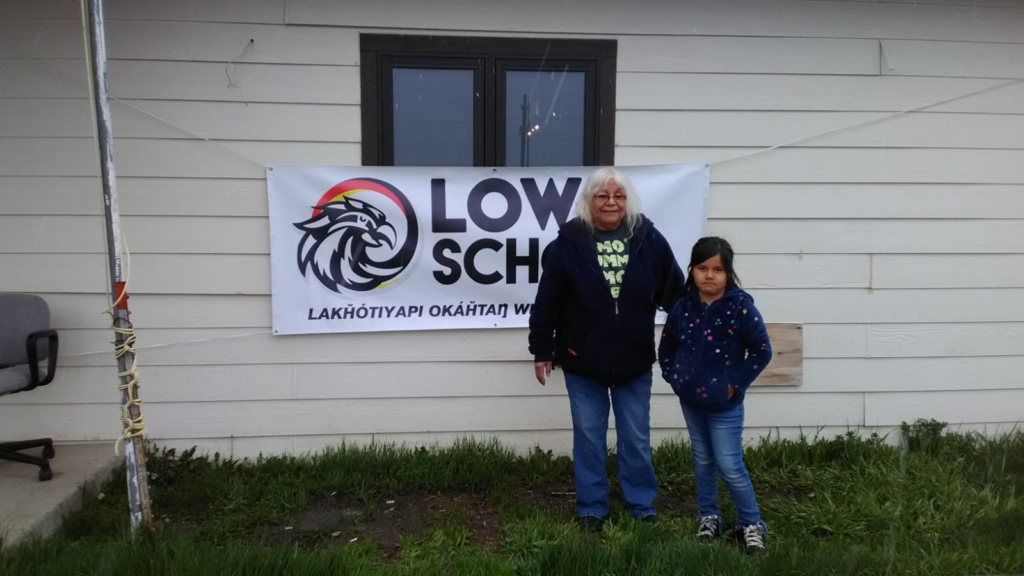
(The interview transcript has been edited for length and clarity.)
Rami: So tell me how you are, please!
Renee: I’m doing well.
Manny: Good– busy though! With the school and everything.
Renee: The past two weeks I put in over 100 hours with board meetings, Lakota language activities in the evenings for parents…So, pretty grueling! We’re hoping it will lighten up as far as not having so many start-up tasks and duties.
Rami: And I see you’re looking for more staff?
Renee: Yes, we’re looking for another teacher for first grade, plus a bus driver, and a cook.
Manny: Advertising for a bus driver– and we’re looking for a building! A permanent place to put our school, a place to call our own.
Renee: And we want to get in touch with a school for at-risk children who experience PTSD and anxiety and other SEDs– I think that would be important to integrate into our language school, because our language has been so non-acceptable for so long. I think we really need to overcome some brainwashing in regard to our language. I know, including myself, there are those mental blocks there: people see Lakota as foreign, not as part of who we are. And they’re so disconnected and detached from the language– maybe when grown, people don’t even know any words, or if they do it’s one or two words.
Manny: We’ve been getting overwhelming support from some entities, but one of the local schools here, we called them about some kind of school business, and the secretary referred to us and said: “Oh you’re not a real school.”
Renee: So we kind of got mixed feelings [by others] towards our school. Some are really supportive, they want to donate chairs from the BIE [Bureau of Indian Education]. And others, also from the BIE, are saying “you’re not a real school.” But, we cannot allow the opinions of others to deter us. We’ve been coordinating really closely with an academy, it’s a private nonprofit, a Christian school. The lady gives us a lot of support and ideas.
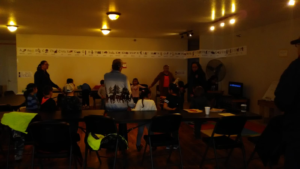
Rami: I heard, Renee, you speak about blocks or gaps in the language. Will you speak more about that?
Renee: Our whole view of the language has been affected by boarding school. For Manny, who went to day school at seven years old, they wouldn’t allow him to speak Lakota, and that really affected him. He came to that way of thinking that he doesn’t speak Lakota in public places. In his community, everybody spoke Lakota, but when they come back home to Eagle Butte they wouldn’t speak Lakota.
When I went to school there were girls my age that would only speak English. All this time later, I find these old friends I knew in high school and discover that they’re fluent Lakota speakers, but they would never speak it in school, because they were, I’d say, conditioned or punished into not speaking Lakota. That was a real surprise to me to learn that they were really fluent. These are the gaps that I’m talking about.
My parents would only speak to me in Lakota words here and there– I’m not fluent. I’m going to Lakota summer institutes, I’m a second language learner. But Manny grew up with it and he had to learn English too. That happened a lot, where people in the boarding schools, like my parents and grandparents, were punished for speaking Lakota. So they just learned to speak English.
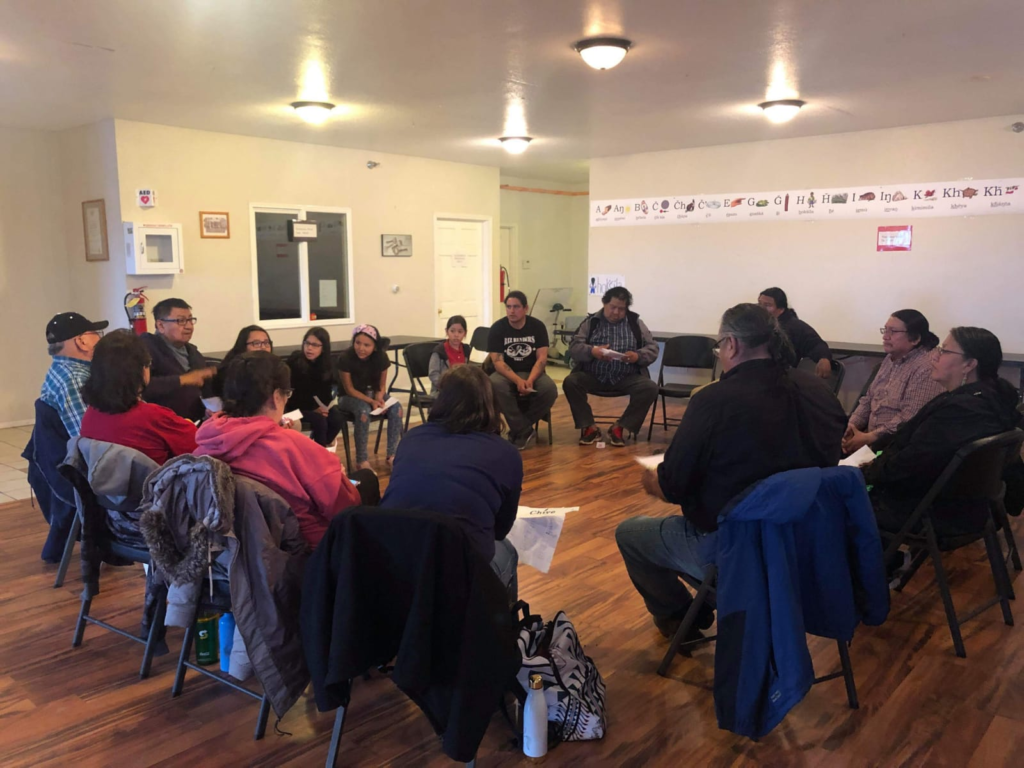
Now we’re trying to undo that. We want to create a safe space at our school, and when we have community meetings, like tonight, we want to create a safe, supportive environment where people can come, learn our language, not feel ridiculed, not feel that they’re going to be criticized. We do some activities where we have fun learning the language, and then we have serious discussions about why some of us don’t speak the language that well. So there are gaps where there are those of us who are learning the language again, those of us who already know, and those who are beginning to want to learn.
There are quite a few people interested since we started community meetings, possibly anywhere from 10 to 25 people. We have one or two that come all the time, every week. So we know that there is going to be some people who are going to be really helpful to bring the language back, along with our students.
Manny: So when I was growing up we lived by the American education system, it never supported [Lakota] language. As a consequence, starting from 7-12 grade I stayed in a dormitory, and we never spoke Lakota– just to the ones who I knew spoke it. So we’d speak it a little bit.
I didn’t know some of my other classmates knew how to speak Lakota until three or four years down the road. That suppression happened to all of us. And so we need to move out of that place and start talking about– start talking Lakota.
Years later when I met these same guys, we found out we can speak Lakota– we don’t know why we didn’t speak Lakota to each other before. Later we come to find the system didn’t support it, and the consequence too is that we never learned the real history, what we had. Our history was never taught to us. We find these things out later.
I’m really excited about this school, and I know it’s a slow start but I think, in my heart, it’s going to start to pick up. We’ve been so assimilated that some of us didn’t want to be Indians at one time, and our education system in boarding schools was “kill the Indian, save the man” deal. We’ve been going through those phases and, finally, we have our immersion schools!
Like I said before, a lot of us think we’re going to save these little kids with our language, but actually, they’re going to save us, you know, in the future.
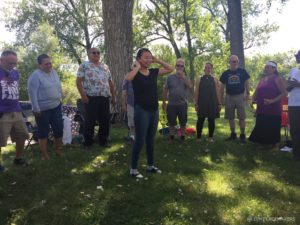
Fluency is very important. We have a teacher who’s very fluent, and my sister is very fluent. But we’re going to have to, down the road, hire a second-language learner who’s very serious, because all these other immersion schools in Standing Rock and elsewhere are run by second language teachers.
I know Zen Peacemakers supported us, and we’re very grateful, and so, it’s a struggle but we have to keep focus and keep going!
Rami: I’ve experienced both of you, Manny and Renee, when you pray, I hear you praying in Lakota. I know for me, English is not my first language– my first language is Hebrew, which was a dead language until 100 years ago. Nobody spoke it other than for prayer and Torah study. It was revitalized, so I really feel you. I wonder if people don’t speak Lakota, does that mean that they don’t pray?
Manny: I think at one time, in our ceremonies, our helpers say to us that you need to speak in Lakota, but that has changed since that time, and speaking from experience– I went to this one helper, and his helpers, they understood Lakota and they also understood English, so they prayed both ways.
I think praying in Lakota, you make all those connections. We as human beings, and our environment, and all the animals…We are all connected in some way but a lot of our non-Indians don’t see that connection. So that’s why we always say at the end, Mitakuye Oyasin, “we are related to everybody, everything.”
I didn’t understand until later on why we say that: Mitakuye Oyasin. We just, we’re connected to
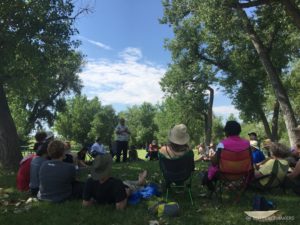
all, even our little bugs and insects, we’re all, we all have a place. But praying, prayer is very powerful I think, and traditionally we put ourselves last in the prayers. And we pray for our relatives and our families. That’s very important. I think prayers need to be said and continued all the time. In any language, it’s answered.
Renee: I was told in Lakota, the spirits know you by your Lakota name. That’s why it’s so important for children and adults to have a Lakota name, so that if you ever go on the other side, when you take your journey, then the spirits over there will know you by your Lakota name.
To me, it’s really something when you can speak your prayers for spiritual connection in Lakota, with the ceremonies that were given to us. If you can pray in Lakota that’s really important.
Speaking of my spiritual experiences over the years, I will say one thing – and I know language advocates don’t agree sometimes, spiritual leaders don’t agree, especially our Lakota ones – but to me, if you have a spiritual connection, it doesn’t matter what language you speak it. In the spiritual realm, language is not significant to me.
There’s a subconscious communication that doesn’t need words. If you ever reach that connection, you will know what I’m talking about. In the spiritual realm, there’s no language, boundaries or limitations. To me, I’ve had dreams where someone is communicating to me but they’re not using language. They just – here to there – thoughts.
So. To me, language is important in some instances, but when it comes to the aura of how we’re connected, I think there’s a spiritual language. And if you get to that level, you have a subconscious connection and there’s no language there. There’s a true connection when you get to that level. But I do really think our language is sacred; I think it’s a part of who we are and it makes us who we are with our identity. It connects us to our ceremonies, our culture– everything is in our language as far as our culture, spiritual ways and ceremonies.
So language is important for our spiritual ceremonies, but if it comes down to it you can shoot past it [laughter].
Manny: I told my students that language is the basis of our culture. In Lakota, culture is all about kinship, Mitakuye Oyasin, where we’re related to everything. They give us values that we’re supposed to follow. And this government that’s not our government, as a consequence they don’t think they need to follow values that are important and connected to knowing what’s right from wrong.
Rami: How does it feel to see your children and grandchildren speak Lakota?
Manny: My uncle has a grandchild, and his name is Amos. He’s six or seven. He went through an immersion school so today he speaks Lakota. I met him in Rapid City and I shook his hand and we started conversing– which was awesome! I really believe that you can pick up the language [later on in life].
I had an experience of learning English, and I still have little problems with English you know, but that’s the goal we have here– speaking children, here, the very first from Cheyenne River. They never had an immersion school before.
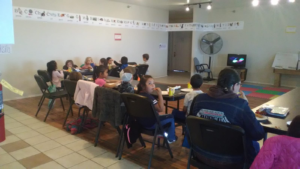
There’s a big change there, some see it, some don’t. But we have to change in order to get our children speaking, and we’re not fully equipped either, but we’re doing what we can right now. We want to be connected to technology too, and we could do that, teach kids with little iPads…
Renee: … We’re glad we met you guys, at times the Zen Peacemakers, they feel kind of like a lifeline to us, to stay connected to the world. Because locally, the dreams or vision that Manny has, and the lifestyle we choose to live by, it’s not perfect. People have a hard time understanding why we choose to be alcohol and drug free, why we choose not to go gambling, why we don’t even smoke cigarettes, those kinds of things. We just…We’re trying to be healthier for ourselves and our children.
We’re still working on being healthier, but we feel like we’re a part of a lot of our community, that people kind of look to us for certain things. And at the same time, we feel detached or disconnected in some way because we’re not the run of the mill type to ‘just join right in with everybody.’ We kind of set some goals for ourselves and our children and our community, and we just… Want a better way of life for our communities. Because of that, some people support us and some people totally don’t support us.
And that’s ok, but when you don’t feel supported, and sometimes to get the personal attacks, it’s like you feel discouraged at times, and you wonder what you’re doing this for. And then you remember “that’s right, we are going to meet with the Zen Peacemakers again,” you know, twice a year.
We start to look forward to those times because we make a connection with the Zen Peacemakers and we feel like you and your group – and I know there’s many more than just the ones we’ve met – we feel accepted by you guys, and that you honor us by having us host you with the Bearing Witness. We sometimes wonder how we fit into that, but we’re glad we’re a part of it– I know for myself. And I look up to you guys too, Peacemakers.
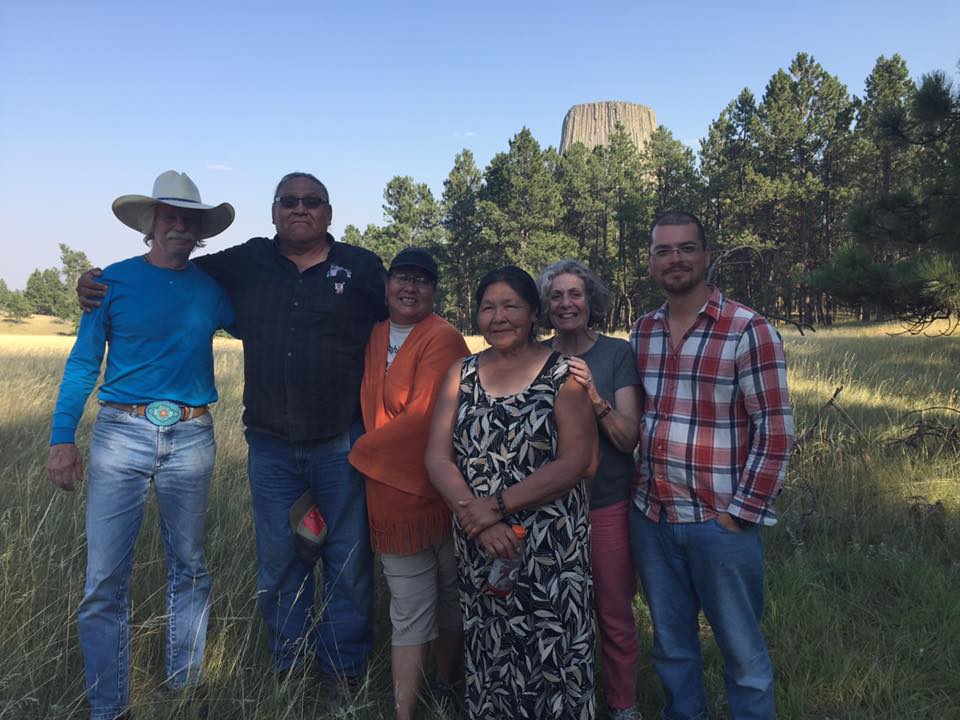
Manny: Yeah, Violet said, “Are you interested in meeting with the Zen Peacemakers?” [Violet Catches is another of the Lakota Elders who host ZPI’s Native American Programs.] I had a preconceived idea that you’d all be wearing these yellow robes, and we’re all gonna be somewhere and we’re gonna wear robes…[laughter]. But that wasn’t the case. But your group is very curious about what beings– what being human is about. Claudia said, “Who are these Zen people? They’re very nice people!” And I said, “Yeah they are very nice people Claudia.” And that’s when Eve said, “Oh, we’re gonna have to move beyond being nice!” [Laughter]. I think you guys are a very great help.
And sometimes we need help in other areas, especially our connections to the land. As you know there’s a group of Australians coming– elders– and they want to know how we’re connected to the land. We’re looking forward to meeting them. They have their stories too, so I think it’s gonna be a good meeting. Exchange stories. We only have one planet to live on, you know. We need to take care of it.
As far as the ‘Zen’ people, your group is very caring and you guys don’t push things on people as others do– you talk about it and you see what it’s all about. So in some ways, I think Lakotas are Zens too.
Renee: I see a lot of similarities because I see a lot of movies from Tibet, the mountains, Himalayas, and they have all these beautiful colored flags– and we have flags too, prayer flags. I see a lot of similarities between Buddhism from India and ourselves. There’s a lot of things that connect us: more than what separates us. […]
When we’re gone, what will our children remember about us? Will they remember that we fought with everybody, or that we were kind, respectful and did our best to make our world a better place? It sounds cliché but it’s just real, basic and simple. In our Lakota way, being common was what life was all about. Being common. Be who you are, be simple, and don’t let your pride get ahead of you too much. Ikce wicasa – common man. Ikce winyan – common woman [Pronounced (ick-chae wee-Cha-sha) and (ick-chae ween-Yan)].
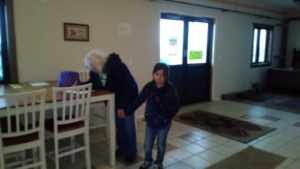
It’s a hard life to live, though. Manny’s relatives– if I didn’t speak up and say ‘let’s get along’– they think I’m wanting to be like a white person because I say that. But it’s not that, it’s actually the Lakota way, Waonshila [WA-Ooh-Shee-La], have compassion. We really got away from all that because of the historical trauma that we live with since the massacres, boarding school and governing policies toward us.
So that’s what I want for our children, to address the historical trauma so they can overcome not feeling good about their language, not feeling good about their culture. I know if they could they would embrace it: this is me, this is who I am, this is who my grandparents were, this is how they lived and how they respected each other.Who would not want that kind of life? If they felt it? That’s what we want to create for our school, a place where children can come and parents can come and they feel safe, the language is OK here, we’re not afraid to speak it, and we accept it as a part of who we are– as one of the most important things about our identity. If you feel good about yourself, you’re going to be accepting of others too. If you accept yourself for who you are, you can accept others for who they are. I really look forward to that happening.
I think some people would really benefit from knowing the Zen Peacemakers. Because I’ve benefited from knowing the Zen Peacemakers, and Claudia has last summer. To me, you have to start somewhere with sharing who you are and sharing with others about yourself. I’ve said before when Eve [Marko] asked about Absolution, it is a person-to-person thing. I don’t think you can absolve a whole group of people or whole race of people – I think it’s always going to be individual to individual. If I can know this person that was part of these people that did this to my people, yet this person is a good person and they’re not the type of person who did that to my people, then that’s when healing starts. Where you’re not focusing on something negative that happened 100 years ago. There are so many people that carry that yet today.
Manny: They’re angry!
Renee: So angry, it’s like it happened the other day. I know that because when I watch massacre movies, whether its Rwanda or the Holocaust, or if there’s something in Alabama– it’s right there for me. Right there. It comes right back. And I know that’s from what we experienced as a people over 100 years ago. And I think that those types of feelings, they don’t go away. They never go away, they’re always with us, here in our DNA. But we can learn a way past them, through them. We can learn a way to live without feeling that Hate, without feeling that…that Trauma. I know we can because I’ve overcome trauma– I still remember them, but they don’t affect me today like they once did, because I chose to work through them and heal from them. But it’s all about wanting to heal. Han, hecetu we ksto! (“Han, Hai-che-two Wey ksto”, Yes, that is the way it is!)
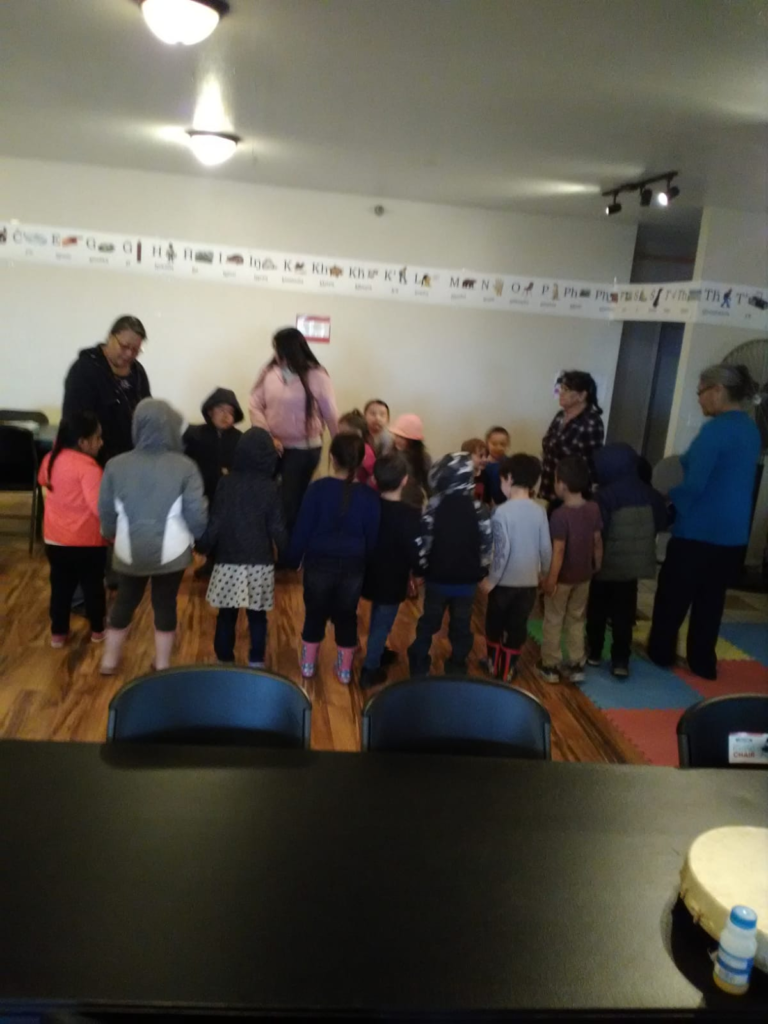
To make a donation to the LOWI school, checks are welcome at: P.O. Box #43 LOWI School, Eagle Butte, SD 57625
Philamayaye!
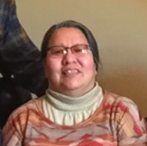 Renee L. Fast Horse-Iron Hawk (Tokahe Hi Hunni Win, Arrives First Woman). An enrolled member of the Wakpa Waste (Good River) Cheyenne River Lakota Tribe, Renee has worked in different capacities in behavioral health, conducting research and active in disease prevention, and finishing her graduate work in Lakota Management and Leadership. She serves on the boards of Lakhota Advocates Okolakichiye (Society), Three Rivers Mental Health Board, Lakhota Circles of Hope, Heartbeat at Wounded Knee Survivor Descendants Okolakichiye (Society), and the Lakhota Languages Teachers Okolakichiye (Society). She lives with her mihingna (spouse) Manny Iron Hawk, Oglala, and 6 adult children. Read Renee’s complete bio.
Renee L. Fast Horse-Iron Hawk (Tokahe Hi Hunni Win, Arrives First Woman). An enrolled member of the Wakpa Waste (Good River) Cheyenne River Lakota Tribe, Renee has worked in different capacities in behavioral health, conducting research and active in disease prevention, and finishing her graduate work in Lakota Management and Leadership. She serves on the boards of Lakhota Advocates Okolakichiye (Society), Three Rivers Mental Health Board, Lakhota Circles of Hope, Heartbeat at Wounded Knee Survivor Descendants Okolakichiye (Society), and the Lakhota Languages Teachers Okolakichiye (Society). She lives with her mihingna (spouse) Manny Iron Hawk, Oglala, and 6 adult children. Read Renee’s complete bio.
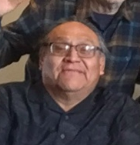 Manny Claude Iron Hawk is an Ikce Wicasa or a common man of the Oglala and Howozu within the Oceti Sakowin, the Seven Council Fires of the Dakota/Lakota/Nakota nation. His Great-Great-Great-Grandfather “Chetan Maza”, Iron Hawk, fought for the Lakota way of life at the Battle of the Little Big Horn, June 25, 1876. His immediate family members include “Hasani” (meaning partner), Renee Fast Horse-Iron Hawk, and his eight children. He has a Master’s Degree from Sinte Gleska University, graduating in August of 2013. Presently, Manny is a Science teacher for the Junior High School at Takini School. He serves on the Missouri Breaks Community Advisory Group, Circle of Hope Curriculum Board, All Nation Healing Center Board and serves as a Frazier Memorial Church member. His inspirations include being an Ikce Wicasa by following his Lakota values, Natural laws, custom laws, and Spiritual laws. Read Manny’s complete bio.
Manny Claude Iron Hawk is an Ikce Wicasa or a common man of the Oglala and Howozu within the Oceti Sakowin, the Seven Council Fires of the Dakota/Lakota/Nakota nation. His Great-Great-Great-Grandfather “Chetan Maza”, Iron Hawk, fought for the Lakota way of life at the Battle of the Little Big Horn, June 25, 1876. His immediate family members include “Hasani” (meaning partner), Renee Fast Horse-Iron Hawk, and his eight children. He has a Master’s Degree from Sinte Gleska University, graduating in August of 2013. Presently, Manny is a Science teacher for the Junior High School at Takini School. He serves on the Missouri Breaks Community Advisory Group, Circle of Hope Curriculum Board, All Nation Healing Center Board and serves as a Frazier Memorial Church member. His inspirations include being an Ikce Wicasa by following his Lakota values, Natural laws, custom laws, and Spiritual laws. Read Manny’s complete bio.

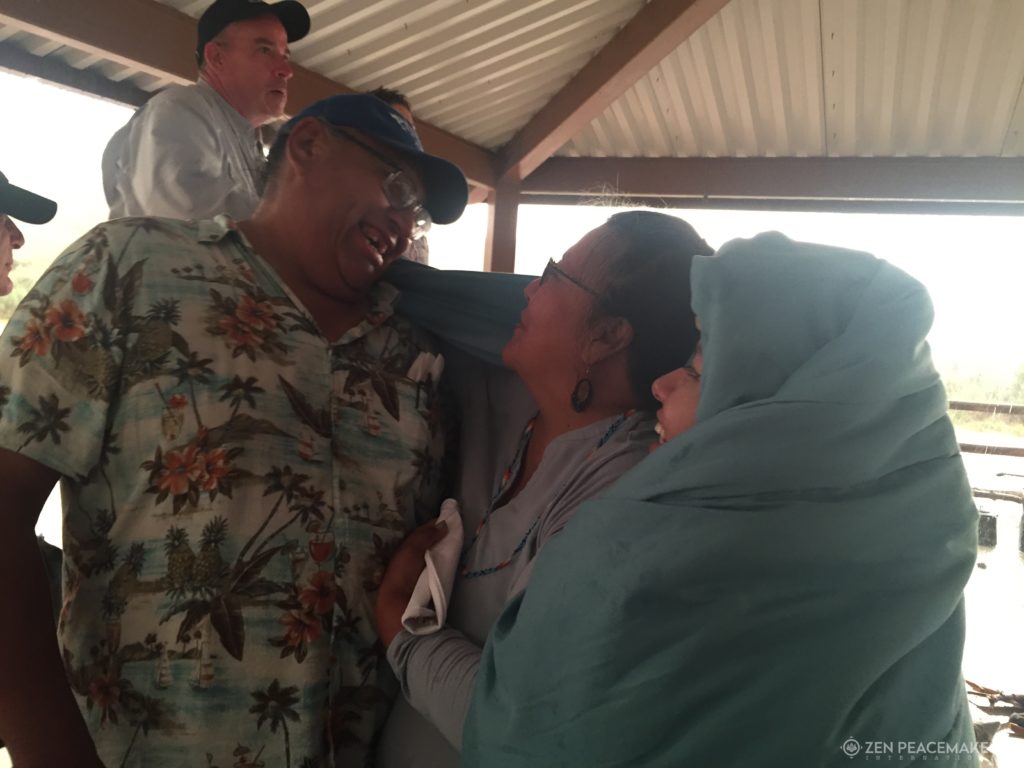

2 Responses
Thank you for sharing this interview, Rami, and, Manny and Renee, your willingness to be so open and honest about your challenges, along with your commitment pass on the deep wisdom of your loving and respectful traditions – wonderful ‘common’ peacemakers!
“When we’re gone, what will our children remember about us? Will they remember that we fought with everybody, or that we were kind, respectful and did our best to make our world a better place? It sounds cliché but it’s just real, basic and simple. In our Lakota way, being common was what life was all about. Being common. Be who you are, be simple, and don’t let your pride get ahead of you too much. Ikce wicasa – common man. Ikce winyan – common woman [Pronounced (ick-chae wee-Cha-sha) and (ick-chae ween-Yan)]. “
This story reminds me of when the Jews started to revive the speaking and writing of Hebrew in their aspirations to return to their native homeland os Israel, and again become an independent nation.
Perhaps Rami Efal also identifies with this story because of its similarity to the story of the Jews and their return to Israel.
I know how proud I feel when I hear my children and grandchildren speaking Hebrew.